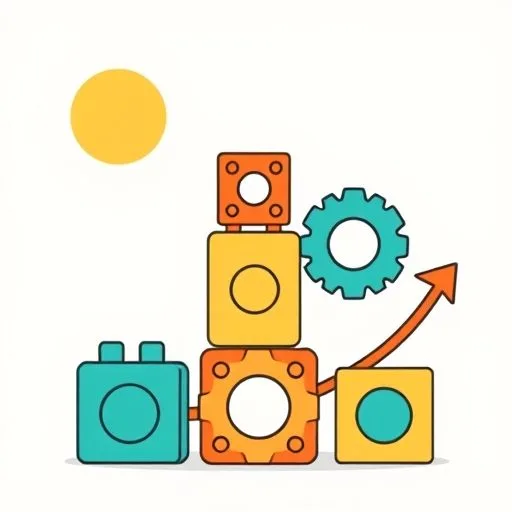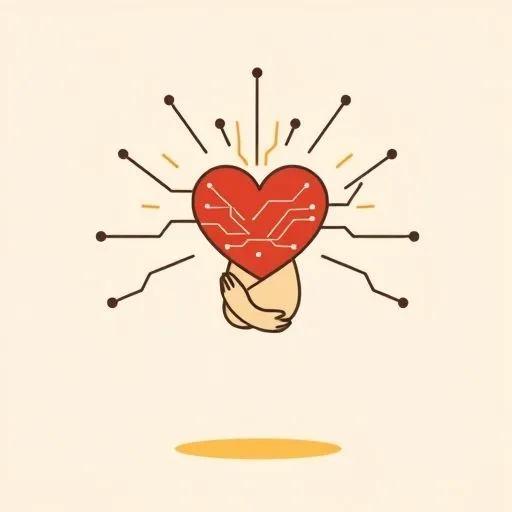
You know that moment? When dinner’s simmering, work emails wait unanswered, and you catch your preschooler solemnly asking a speaker box for dinosaur facts. It hits you then – we’re their first translators for this new world. Not the tech CEOs, not the coders. Us. The parents reheating leftovers while navigating uncharted digital terrain. And that heavy, beautiful responsibility? It changes everything.
The Safety Net They Can’t See

We’re not building firewalls or decoding algorithms tonight. Our job’s simpler and deeper. (Though honestly, sometimes I wish I had that decoder ring when my daughter’s AI homework helper gives questionable answers!)
That worried look when your tween trusts a chatbot’s homework answer? That’s our starting point. Teach them what Alexa won’t: every tool has limits. ‘Let’s check that together’ becomes our mantra when answers feel too slick. Show them the seams – the human fingerprints behind the code.
AI isn’t magic, and that’s okay. The real magic? Their growing mind learning to ask ‘Why should I believe this?’ before clicking ‘accept.’
Commands vs. Conversations: The Quiet Lesson in Every Interaction

Notice how they bark orders at voice assistants? That creeps into playground dynamics if we’re not careful.
So we pivot. When they demand ‘Play Bluey!’, we model ‘Could you please play Bluey?’ – and explain why. Not to coddle machines, but to protect their humanity. Those moments at the sink, scrubbing lunchboxes while coaching polite requests? That’s where digital citizenship begins.
Tech isn’t just about what it can do, but how we approach it. And that ‘how’ lingers long after the screen sleeps.
The Skepticism Superpower

He believed his AI friend when it swore llamas could fly. We didn’t laugh. We explored. Together, we fact-checked with library books, bird flight videos, even llama memes (…turns out they wish they could). That afternoon’s treasure hunt taught more than animal facts – it built bullshit detectors stronger than any parental control app. Watching his eyes narrow thoughtfully at ads now? That’s parenting gold, my friends.
Now we ask together: ‘Who made this?’, ‘Why might they want me to think this?’, ‘What’s missing?’
Critical thinking becomes our family sport. And honestly? Watching their eyes narrow thoughtfully at ads – that’s parenting winning.
Future-Proofing Playtime

Legos teach algorithms better than lectures. Watching them rebuild fallen towers? That’s iterative problem-solving – tech’s core skill. When they negotiate playground rules, they’re coding social contracts.
Our role? Name those skills. ‘You just debugged your sandcastle design!’ makes their brilliance conscious. Tomorrow’s tech will demand adaptability even ChatGPT can’t mimic.
Good news? Mud pies and cardboard forts build that. Unstructured play isn’t downtime – it’s neural networks training creativity no AI can replace.
The Human Filter They’ll Always Need

AI writes slick book reports, but can’t gasp at plot twists. It generates birthday poems, but never feels their warmth. That’s our opening.
We highlight emotional gaps: ‘This app answered quickly, but did it understand why you’re sad?’ Our secret weapon? Dinner table stories. Unrushed recollections of scraped knees and found caterpillars – the data no algorithm harvests.
Those messy human moments? They’re the antivirus against emotional outsourcing. This tech-native generation might be AI-fluent, but we’re their guides to staying gloriously, irreplaceably human. Can you feel that energy? That’s the magic we’re protecting!
Source: Operationalize AI Accountability: A Leadership Playbook, Wharton, 2025-09-23
